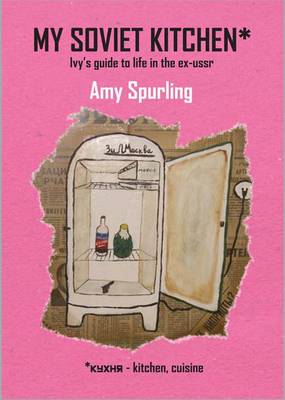Reviewed by Leah on
(Blurb taken from GoodReads, as it was easier than writing my own which would run in a similar vein).
When I was approached by RoastBooks, an independent publisher, about My Soviet Kitchen I was quite intrigued. I had a quick look on Amazon, read the press release and I thought it was definitely worth a read as it would not be something I had ever read before. Not to mention the fact that when I read the press release, it stated that as well as receiving the book, you would also receive a companion guide, all neatly presented in a bag as well as a bottle of vodka. I’ve had this confirmed by the publishers that should you purchase the book, that is how it will be presented. As such, I’ll be reviewing both the book and the companion guide!
The blurb on the back of My Soviet Kitchen states that it is “neo chick lit, with a darker side, a vodka twist and a generous slice of post-Soviet living” and My Soviet Kitchen ticks all of those boxes, despite the fact I have no idea what “neo chick lit” actually is, or means. I know absolutely nothing about Russia, or the USSR as it was known in the 90s which is the time in which the book is set so for me the book was going to be a bit like a history lesson. And, unfortunately, much like the history lessons I had at school, My Soviet Kitchen didn’t really hold my interest. I don’t know if it was the fact that the Russian/USSR setting kind of put me off a bit because although I do enjoy reading about a new country, Russia isn’t exactly somewhere I want to learn about, or somewhere I can imagine myself visiting (with the greatest of respect to the country of course).
I also found Ivy’s footnotes at the bottom of some pages a little irritating because they kind of interrupted the flow of the book and I ended up ignoring them after a while because I didn’t know how to fit them in properly; do I read the as soon as I come across the little number telling me there’s a footnote, or do I wait until I get to the bottom of the page? I don’t know how that works and if the information in the footnotes are indeed relevant, then I don’t see why they weren’t put into the text properly, instead of as a footnote. Then there is my main problem with the book: it jumps around. A lot. One minute Ivy is in her kitchen, replying to a letter, and the next she’s in Uzbekistan at a wedding. I like a little bit more flow when it comes to reading, because choppy kind of books make me rather confused because one minute I’m in one place and then in another minute I’m in somewhere totally different and it’s hard to keep up with a plot like that.
The book was, on a whole, easily well written, don’t get me wrong, I just couldn’t get a grasp on the plot and the entire Russian thing confused me and the book just seemed to be outside of my usual comfort zone and despite a fairly good start, I just found myself getting bored of it really quickly. Because the book is written in a diary style (which is what makes it so easy to read), I also felt I couldn’t get a good enough grip on any of the characters. We knew the bare bones about Ivy and everyone around her but not enough to make her “real” in my mind; I couldn’t imagine her at all and I couldn’t imagine what her life was like in Russia and it disappointed me I wasn’t able to fully immerse myself in the story as I might have liked. I’m fairly sure the book will have many people who adore it, and who can understand it all but it just wasn’t for me.
The last thing I would like to mention is the “Companion Guide”, the little booklet that comes with the book itself. Ivy mentions many different things in the book which you can then refer to in the guide to see what it is. It mainly relates to food and recipes, but there’s other things in there too and I’m sure anybody who loves Russia will adore the book and it’s companion because it is well-presented and the companion book is in full colour with plenty of photographs and what-not. So it might not have been to my taste, but it will certainly be to the taste of many other people!
Reading updates
- Started reading
- 18 July, 2010: Finished reading
- 18 July, 2010: Reviewed
